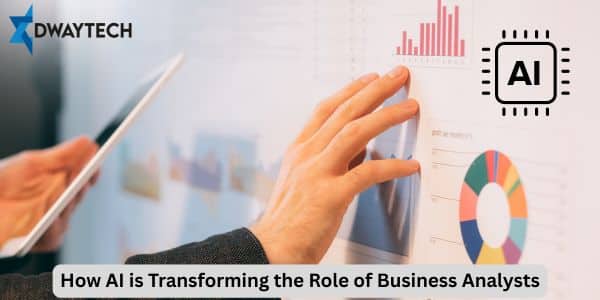How AI is Transforming the Role of Business Analysts – Artificial Intelligence (AI) is no longer a futuristic concept—it’s already reshaping industries and redefining job roles. The field of business analysis has seen some of the most significant changes. Traditionally, business analysts (BAs) served as the bridge between stakeholders and IT teams, gathering requirements, conducting research, and offering data-driven insights. But today, with the rise of AI, their role is evolving rapidly.
From Data Collectors to Strategic Advisors
Before AI, business analysts spent significant time manually collecting, cleaning, and analyzing data. These tasks were often repetitive and time-consuming. Now, with AI tools handling the heavy lifting—like data mining, trend analysis, and predictive modeling—BAs can focus on higher-level strategic thinking. They are shifting from being mere data interpreters to becoming valuable advisors who help shape business decisions.
Real-time Analytics and Enhanced Insights
AI tools provide real-time analytics, enabling business analysts to react swiftly to changes in market conditions or customer behavior. With machine learning models and natural language processing (NLP), they can uncover patterns and sentiments hidden deep within large datasets—capabilities that were once out of reach for traditional analysis methods. This means faster, more informed decision-making.
Automated Report Generation and Visualization
Business analysts used to spend hours building reports and dashboards manually. Today, AI-powered tools like Tableau, Power BI with AI integrations, and Google’s AutoML can automate report generation and even suggest visualizations based on data types. This lowers human error, guarantees consistency, and boosts productivity.
Improved Forecasting Accuracy
AI can process and learn from historical data at a scale no human could manage. For business analysts, this translates to more accurate forecasting models. Whether it’s predicting customer churn, financial trends, or supply chain disruptions, AI allows analysts to make predictions with a higher degree of confidence and reliability.
Evolving Skill Sets for Business Analysts
As AI takes over manual and technical tasks, business analysts need to upskill in areas like:
-
Data literacy and AI model interpretation
-
Ethical implications of AI use
-
Communication and storytelling with data
-
Cross-functional collaboration with data scientists and engineers
Essentially, the role is becoming more hybrid—part analyst, part strategist, part technologist.
AI as a Collaborative Tool, Not a Replacement
Despite the fear of job displacement, AI isn’t replacing business analysts—it’s augmenting their capabilities. AI gives analysts more time to concentrate on strategic planning, creative problem-solving, and stakeholder engagement by automating repetitive processes. Businesses are now looking for analysts who can use AI tools effectively rather than compete with them.
Conclusion
AI is a tremendous force that is changing how businesses function, evaluate, and develop; it is no longer just a trendy term. For business analysts, this transformation is both a challenge and an opportunity. The traditional role of gathering and reporting data is being overtaken by intelligent automation, but that doesn’t diminish the value of the human analyst. Instead, it elevates their importance.
Business analysts need to keep up with the latest developments in AI. The future belongs to those who can adapt, learn, and leverage AI to deliver deeper insights, anticipate trends, and drive innovation. Analysts who embrace AI as a collaborative partner, not a competitor, will find themselves at the heart of strategic decision-making in any forward-thinking organization.
In this AI-driven world, business analysts are no longer just interpreters of data; they are the visionaries who translate machine intelligence into human impact. The role is evolving—but it’s far from disappearing. It’s becoming more essential than ever.
FAQs
1. Will AI replace business analysts in the future?
No, AI will not replace business analysts. Instead, it will augment their role by automating routine tasks, allowing them to focus on strategic and high-value activities.
2. What AI tools are commonly used by business analysts?
Popular AI tools include Tableau with AI integrations, Power BI, SAS, IBM Watson, and Google AutoML. These tools help with data visualization, predictive analytics, and report automation.
3. What skills should business analysts develop to stay relevant in the AI era?
Analysts should focus on data literacy, AI model interpretation, ethical AI use, and communication skills to stay competitive and add strategic value.
4. How does AI improve business decision-making?
AI provides faster, real-time insights, uncovers hidden patterns, and enhances forecasting accuracy, leading to more informed and timely decisions.
Also, Useful Links:
Business Analyst Training Course Online Request Demo











